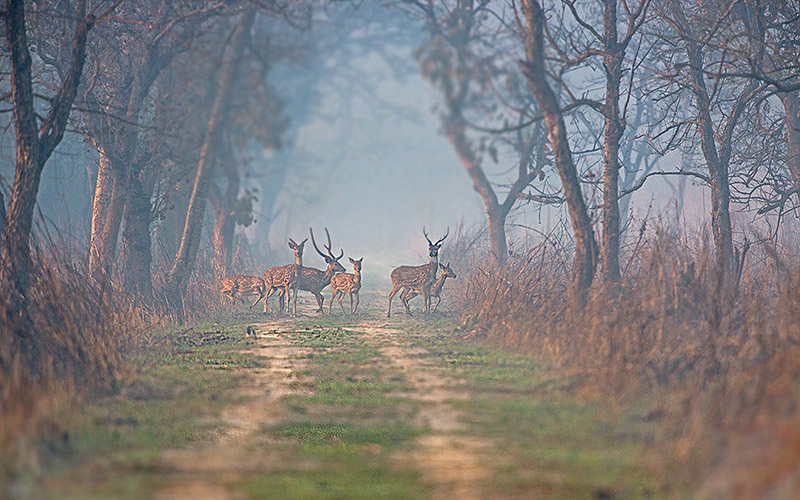Welcome to Dudhwa National Park, a hidden gem in the heart of India. If you're a wildlife enthusiast, nature lover, or simply seeking a thrilling adventure, this national park will undoubtedly captivate your senses. Nestled in the lush Terai region of Uttar Pradesh, Dudhwa National Park offers a unique and diverse ecosystem that is home to a wide variety of flora and fauna.
Dudhwa National Park
Dudhwa National Park, often referred to as "Dudhwa Tiger Reserve," was established in 1977 and covers an area of approximately 490 square kilometers. The park shares its borders with Nepal's Kishanpur Wildlife Sanctuary in the north and the Katerniaghat Wildlife Sanctuary in the south. Together, these protected areas form the Dudhwa Tiger Reserve, covering a vast expanse of over 1,200 square kilometers.
The Rich Biodiversity
Dudhwa National Park boasts an incredible biodiversity, making it a haven for wildlife conservation. The park is renowned for its efforts in protecting endangered species, including the Bengal tiger, Indian rhinoceros, swamp deer (Barasingha), and the Gangetic dolphin. With over 450 species of birds, Dudhwa is also a paradise for birdwatchers.
Exploring the Terai Ecosystem
The Terai ecosystem, characterized by its marshy grasslands, dense forests, and numerous rivers and streams, provides a unique habitat for an abundance of wildlife. As you explore the park, you'll witness the harmony of nature, with majestic animals roaming freely amidst the captivating landscape.
Safari Adventures
One of the best ways to experience Dudhwa National Park is through thrilling safaris. Hop on a jeep safari or an elephant safari and venture deep into the heart of the wilderness. The experienced guides will lead you through the untamed terrain, giving you the best chance to spot the elusive Bengal tigers and other rare species in their natural habitat.
Best Time to Visit Dudhwa National Park
To make the most of your visit, it's essential to plan your trip during the best time of the year. The park is open to tourists from November to June, with the winter months of November to February being the most popular due to the pleasant weather and excellent chances of wildlife sightings.
Accommodation Options
Dudhwa National Park offers a range of accommodation options to suit all budgets and preferences. From luxury resorts to forest lodges and eco-friendly camps, there's something for everyone. Staying within the park's boundaries provides an unparalleled experience of being close to nature.
Birdwatchers' Paradise
For avid birdwatchers, Dudhwa is a dream destination. The park's wetlands and grasslands attract a diverse array of avian species, including migratory birds from as far as Siberia. Keep your binoculars ready as you might spot the vibrant Indian Pitta or the majestic Sarus Crane.
Conservation Efforts and Initiatives
Dudhwa National Park has been at the forefront of conservation efforts in India. The park authorities and local communities work hand in hand to protect the wildlife and their habitats. Initiatives such as anti-poaching drives, habitat restoration, and community-based ecotourism projects have played a significant role in preserving the delicate balance of this ecosystem.
Dudhwa National Park: A Photographer's Delight
For photography enthusiasts, Dudhwa offers a plethora of opportunities to capture breathtaking shots of wildlife and landscapes. From the majestic tigers in their regal stride to the playful antics of elephants, every moment here is a frame-worthy memory.
Wildlife Safaris for Families
Dudhwa National Park is not just for the adventurous at heart; it's also a fantastic destination for families. Share the excitement of spotting animals in the wild with your children as you embark on a memorable family safari.
The Royal Bengal Tigers
Among the many wonders of Dudhwa National Park, the Royal Bengal tigers stand out as the crown jewels. Learn about these magnificent creatures and their significance in the ecosystem.
The Gentle Giants: Indian Rhinoceros
The Indian rhinoceros, also known as the Greater One-Horned Rhinoceros, is one of the main attractions of Dudhwa. Discover their unique features, behavior, and conservation status.
Barasingha: The Swamp Deer
The Barasingha, or the Swamp Deer, is a critically endangered species found in the grasslands of Dudhwa. Explore their habitat and the efforts being made to protect them.
The Elusive Gangetic Dolphin
The Dudhwa region is blessed with the presence of the Gangetic dolphin, an endangered species known for its playful nature and unique habitat.
Flora of Dudhwa National Park
The park's diverse flora includes various tree species, grasslands, and aquatic vegetation. Learn about the vegetation that supports the park's vibrant wildlife.
Dudhwa's Avian Wonders
Delve into the world of colorful and melodious birds that grace the skies of Dudhwa National Park. Spot both resident and migratory birds and understand their significance in the ecosystem.
Conservation of Endangered Species
Discover the conservation projects that focus on saving the endangered species of Dudhwa, including the vulture conservation program and the Crocodile Conservation Project.
Human-Wildlife Conflict Resolution
As human settlements encroach upon wildlife habitats, conflicts may arise. Explore the measures being taken to address these issues and promote harmony between humans and animals.
Responsible Ecotourism
Learn about the importance of responsible ecotourism and how your visit can contribute to the conservation and welfare of Dudhwa's flora and fauna.
Frequently Asked Questions
Is Dudhwa National Park safe for tourists?
Yes, Dudhwa National Park is safe for tourists. The park authorities take all necessary precautions to ensure the safety of visitors during safaris and other activities.
